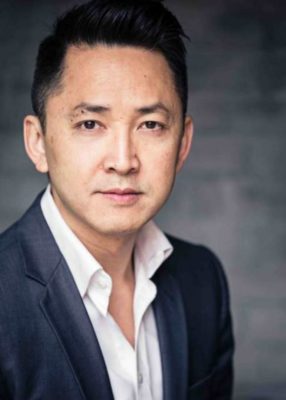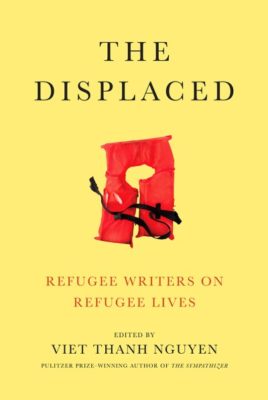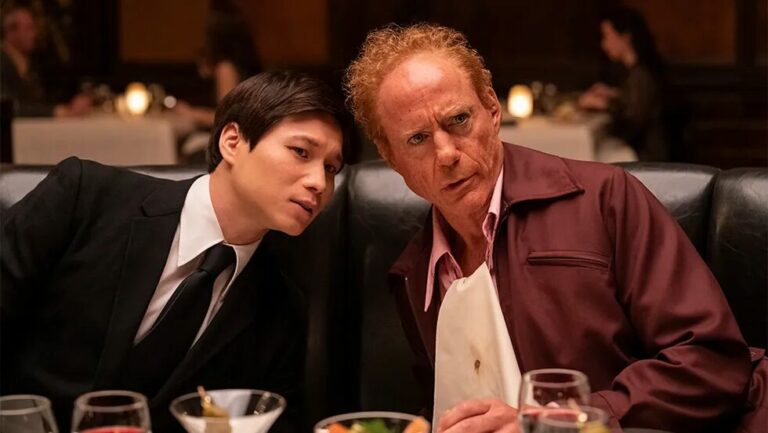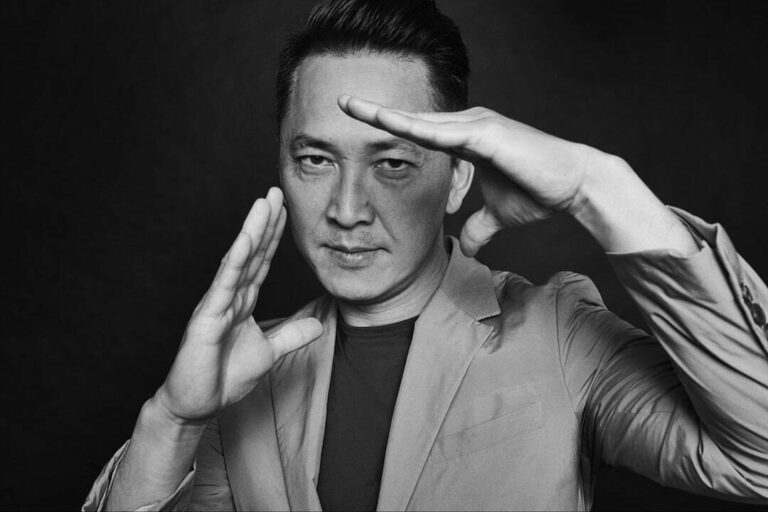Entertainment Weekly discusses Viet Thanh Nguyen’s role as editor for The Displaced. Article by David Canfield originally published by Entertainment Weekly.

For his next project, acclaimed author Viet Thanh Nguyen (The Sympathizer) has taken on the role of editor.
Nguyen has edited the upcoming essay collection The Displaced: Refugee Writers on Refugee Lives, which includes 17 refugee authors telling their stories and illuminating their experiences. The book is being published at a time when discourse around refugees has shifted distressingly in the Trump era, with new caps on refugee settlement being instituted and immigration bans remaining clear policy positions.
The book will be released on April 10 (pre-order it here), with 10 percent of its cover price (a minimum of $25,000) set to be donated by publisher Abrams to the International Rescue Committee (IRC), a not-for-profit organization dedicated to providing humanitarian aid, relief, and resettlement to refugees and other victims of oppression or violent conflict.
In addition to assembling the writers and compiling their work, Nguyen has written a powerful introductory essay for the book, in which he describes his own refugee experience in stunning, at times painful detail. The author has exclusively shared an excerpt of his introduction with EW, which you can read below.

Excerpt from “The Displaced,” edited by Viet Thanh Nguyen
INTRODUCTION
Viet Thanh Nguyen
I was once a refugee, although no one would mistake me for being a refugee now. Because of this, I insist on being called a refugee, since the temptation to pretend that I am not a refugee is strong. It would be so much easier to call myself an immigrant, to pass myself off as belonging to a category of migratory humanity that is less controversial, less demanding, and less threatening than the refugee.
I was born a citizen and a human being. At four years of age I became something less than human, at least in the eyes of those who do not think of refugees as being human. The month was March, the year 1975, when the northern communist army captured my hometown of Ban Me Thuot in its final invasion of the Republic of Vietnam, a country that no longer exists except in the imagination of its global refugee diaspora of several million people, a country that most of the world remembers as South Vietnam.
Looking back, I remember nothing of the experience that turned me into a refugee. It begins with my mother making a life-and-death decision on her own. My father was in Saigon, and the lines of communication were cut. I do not remember my mother fleeing our hometown with my ten-year-old brother and me, leaving behind our sixteen-year-old adopted sister to guard the family property. I do not remember my sister, who my parents would not see again for nearly twenty years, who I would not see again for nearly thirty years.
My brother remembers dead paratroopers hanging from the trees on our route, although I do not. I also do not remember whether I walked the entire one hundred eighty-four kilometers to Nha Trang, or whether my mother carried me, or whether we might have managed to get a ride on the cars, trucks, carts, motorbikes, and bicycles crowding the road. Perhaps she does remember but I never asked about the exodus, or about the tens of thousands of civilian refugees and seeing soldiers, or the desperate scramble to get on a boat in Nha Trang, or some of the soldiers shooting some of the civilians to clear their way to boats, as I would read later in accounts of this time.
I do not remember finding my father in Saigon, or how we waited for another month until the communist army came to the city’s borders, or how we tried to get into the airport, and then into the American embassy, and then finally somehow fought our way through the crowds at the docks to reach a boat, or how my father became separated from us but decided to get on a boat by himself anyway, and how my mother decided the same thing, or how we eventually were reunited on a larger ship. I do remember that we were incredibly fortunate, finding our way out of the country, as so many millions did not, and not losing anyone, as so many thousands did. No one, except my sister.
For most of my life, I did remember soldiers on our boat firing onto a smaller boat full of refugees that was trying to approach. But when I mentioned it to my older brother many years later, he said the shooting never happened.
I do not remember many things, and for all those things I do not remember, I am grateful, because the things I do remember hurt me enough. My memory begins after our stops at a chain of American military bases in the Philippines, Guam, and finally Pennsylvania. To leave the refugee camp in Pennsylvania, the Vietnamese refugees needed American sponsors. One sponsor took my parents, another took my brother, a third took me.
For most of my life, I tried not to remember this moment except to note it in a factual way, as something that happened to us but left no damage, but that is not true. As a writer and a father of a son who is four years old, the same age I was when I became a refugee, I have to remember, or sometimes imagine, not just what happened, but what was felt. I have to imagine what it was like for a father and a mother to have their children taken away from them. I have to imagine what it was that I experienced, although I do remember being taken by my sponsor to visit my parents and howling at being taken back.
I remember being reunited with my parents after a few months and the snow and the cold and my mother disappearing from our lives for a period of time I cannot recall and for reasons I could not understand, and knowing vaguely that it had something to do with the trauma of losing her country, her family, her property, her security, maybe herself. In remembering this, I know that I am also foreshadowing the worst of what the future would hold, of what would happen to her in the decades to come. Despite her short absence, or maybe her long one, I remember enjoying life in Harrisburg, Pennsylvania, because children can enjoy things that adults cannot so long as they can play, and I remember a sofa sitting in our backyard and neighborhood children stealing our Halloween candy and my enraged brother taking me home before venturing out by himself to recover what had been taken from us.
I remember moving to San Jose, California, in 1978 and my parents opening the second Vietnamese grocery store in the city and I remember the phone call on Christmas Eve that my brother took, informing him that my parents had been shot in an armed robbery, and I remember that it was not that bad, just flesh wounds, they were back at work not long after, and I remember that the only people who wanted to open businesses in depressed downtown San Jose were the Vietnamese refugees, and I remember walking down the street from my parents’ store and seeing a sign in a store window that said ‘Another American driven out of business by the Vietnamese,’ and I remember the gunman who followed us to our home and knocked on our door and pointed a gun in all our faces and how my mother saved us by running past him and out onto the sidewalk, but I do not remember the two policemen shot to death in front of my parents’ store because I had gone away to college by that time and my parents did not want to call me and worry me.
I remember all these things because if I did not remember them and write them down then perhaps they would all disappear, as all those Vietnamese businesses have vanished, because after they had helped to revitalize the downtown that no one else cared to invest in, the city of San Jose realized that downtown could be so much better than what it was and forced all those businesses to sell their property and if you visit downtown San Jose today you will see a massive, gleaming, new city hall that symbolizes the wealth of a Silicon Valley that had barely begun to exist in 1978 but you will not see my parents’ store, which was across the street from the new city hall. What you will see instead is a parking lot with a few cars in it because the city thought that the view of an empty parking lot from the windows and foyer of city hall was more attractive than the view of a mom-and-pop Vietnamese grocery store catering to refugees.
As refugees, not just once but twice, having fled from north to south in 1954 when their country was divided, my parents experienced the usual dilemma of anyone classified as an other. The other exists in contradiction, or perhaps in paradox, being either invisible or hypervisible, but rarely just visible. Most of the time we do not see the other or see right through them, whoever the other may be to us, since each of us — even if we are seen as others by some — have our own others. When we do see the other, the other is not truly human to us, by very definition of being an other, but is instead a stereotype, a joke, or a horror. In the case of the Vietnamese refugees in America, we embodied the specter of the Asian come to either serve or to threaten.
Invisible and hypervisible, refugees are ignored and forgotten by those who are not refugees until they turn into a menace. Refugees, like all others, are unseen until they are seen everywhere, threatening to overwhelm our borders, invade our cultures, rape our women, threaten our children, destroy our economies. We who do the ignoring and forgetting oftentimes do not perceive it to be violence, because we do not know we do it. But sometimes we deliberately ignore and forget others. When we do, we are surely aware we are in inciting violence, whether that is on the schoolyard as children or at the level of the nation. When those others fight back by demanding to be seen and heard — as refugees sometimes do — they can appear to us like threatening ghosts whose fates we ourselves have caused and denied. No wonder we do not wish to see them.


